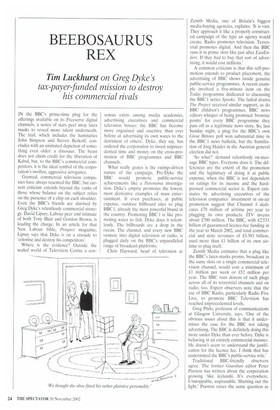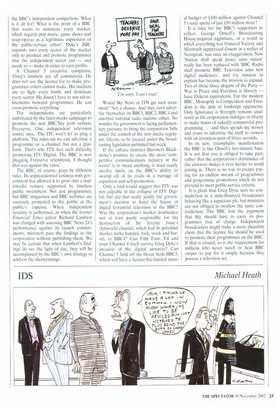BEEBOSAURUS REX
Tim Luckhurst on Greg Dyke 's
tax-payer-funded mission to destroy his commercial rivals
IN the BBC's prime-time plug for the offerings available on its Freeserve digital channels, a series of stars peel away latex masks to reveal more talent underneath. The trail, which includes the luminaries John Simpson and Steven Berkoff, concludes with an animated depiction of something even older: a dinosaur. The beast does not claim credit for the liberation of Kabul, but, to the BBC's commercial competitors, it is the ideal symbol of the corporation's swollen, aggressive arrogance.
Granted, commercial television companies have always resented the BBC, but current criticism extends beyond the ranks of those whose balance on the subject relies on the presence of a chip on each shoulder. Even the BBC's friends are alarmed by Greg Dyke 's relentlessly commercial strategy. David Lipsey, Labour peer and intimate of both Tony Blair and Gordon Brown, is leading the charge. In an article for that New Labour bible, Prospect magazine, Lipsey says that Dyke is on a crusade to 'colonise and destroy his competitors'.
Where is the evidence? Outside the sealed world of Television Centre a con sensus exists among media academics, advertising executives and commercial television bosses: the BBC has become more organised and assertive than ever before at advertising its own wares to the detriment of others'. Dyke, they say, has ordered the corporation to invest unprecedented time and money on the cross-promotion of BBC programmes and BBC channels.
What really grates is the ratings-driven nature of the campaign. Pre-Dyke the BBC would promote public-service achievements like a Panorama investigation. Dyke's empire promotes the lowest, most derivative examples of mass entertainment. It even purchases, at public expense, outdoor billboard sites to plug BBC 1, already the most powerful brand in the country. Promoting BBC 1 is like promoting water to fish. Dyke does it relentlessly. The billboards are a drop in the ocean. The channel, and every new BBC venture into digital television or radio, is plugged daily on the BBC's unparalleled range of broadcast platforms.
Chris Hayward, head of television at
Zenith Media, one of Britain's biggest media-buying agencies, explains: 'It is vast. They approach it like a properly constructed campaign of the type an agency would create. Radio promotes television. Terrestrial promotes digital. And then the BBC runs it in prime slots like just after EastEnders. If they had to buy that sort of advertising, it would cost millions.'
A common criticism is that this self-promotion extends to product placement, the advertising of BBC shows inside genuine public-service programmes. A recent example involved a five-minute item on the Today programme dedicated to discussing the BBC 1 series Spooks. The failed drama The Project received similar support, as do BBC children's programmes. BBC news editors whisper of being promised 'brownie points' for every BBC programme they pass off as a legitimate news story. So, last Sunday night, a plug for the BBC's own Great Britons poll won substantial time in the BBC 1 news bulletin, but the humiliation of Jarg Haider in the Austrian general election did not.
'So what?' demand relentlessly on-message BBC types. Everyone does it. The differences are the extent of the promotion and the legitimacy of doing it at public expense, when the BBC is not dependent on ratings for its income and the hardpressed commercial sector is. Expert estimates by advertising executives of the television companies' investment in on-air promotion suggest that Channel 4 dedicates £70 million of airtime per year to plugging its own products. ITV invests about £700 million. The BBC, with £2.533 billion of guaranteed licence-fee funding in the year to March 2002, and total commercial and state revenues of £3.383 billion, used more than £1 billion of its own airtime to plug itself.
Zenith Media estimates that a plug like the BBC's latex-masks promo, broadcast in the same slots on a single commercial television channel, would cost a minimum of £1 million per week or £52 million per year. The BBC runs dozens of such plugs across all of its terrestrial channels and on radio, too. Expert observers note that the use of BBC Radio, particularly Radio Five Live, to promote BBC Television has reached unprecedented levels.
Greg Philo, professor of communications at Glasgow University, says. 'One of the obvious issues about this is that it undermines the case for the BBC not taking advertising. The BBC is definitely doing this more under Dyke than ever before. Dyke is behaving in an entirely commercial manner. He doesn't seem to understand the justification for the licence fee. I think that has undermined the BBC's public-service role.'
Traditional BBC-friendly observers agree. The former Guardian editor Peter Preston has written about the corporation growing 'like leylandii. It's everywhere. Unstoppable, unprunable. Shutting out the light.' Preston raises the same question as the BBC's independent competitors. What is it all for? What is the point of a BBC that wants to dominate every market; which regards pop music, game shows and soap-operas as a legitimate expression of the public-service ethos? Dyke's BBC expands into every sector of the market only to produce and promote programmes that the independent sector can — and needs to — make in order to earn profits.
A Channel 5 executive complains, 'Greg's instincts are all commercial. He does not use the licence fee to make programmes others cannot make. His instincts are to fight every battle and dominate every sector. He doesn't have to run advertisements between programmes. He can cross-promote everything.'
The independents are particularly embittered by the latex-masks campaign to promote the new BBC/Sky joint venture Freeserve. One independent television source says, 'The ITC won't let us plug a platform. The rules say we can advertise a programme or a channel, but not a platform. That's why ITV had such difficulty promoting ITV Digital. The BBC is now plugging Freeserve relentlessly. I thought that was against the rules.'
The BBC, of course, plays by different rules. Its unprecedented cosiness with government has allowed it to grow into a multimedia venture supported by limitless public investment. Not just programmes, but BBC magazines and BBC websites are routinely promoted to the public at the public's expense. When independent scrutiny is authorised, as when the former Financial Times editor Richard Lambert was charged with assessing BBC News 24's performance against its launch commitments, ministers pass the findings to the corporation without publishing them. We may be certain that when Lambert's findings do see the light of day, they will be accompanied by the BBC's own strategy to address the shortcomings. Would Sky News or ITN get such treatment? Not a chance. And they can't advertise themselves on BBC1, BBC2, BBC4 and assorted national radio stations either, No wonder the government is facing parliamentary pressure to bring the corporation fully under the control of the new media regulator, Ofcom, to be created under the broadcasting legislation published last week.
If the culture minister Baroness Blackstone's promise to create the most 'competitive communications industry in the world' is to mean anything, it must surely involve limits on the BBC's ability to swamp all of its rivals in a barrage of expansion and self-promotion.
Only a fool would suggest that ITV was not culpable in the collapse of ITV Digital, but did that really justify the government's decision to hand the future of digital terrestrial television to the BBC? Was the corporation's market dominance not at least partly responsible for the destruction of Sir Jeremy Isaac's Artsworld channel, which had its potential market niche handed, lock, stock and barrel, to BBC4? Can Film Four, E4 and even Channel 4 itself survive Greg Dyke's invasion of the digital airwaves? Can Channel 5 hold off the threat from BBC3. which will have a licence-fee-funded annu al budget of £100 million against Channel 5's total spend of just £50 million more?
It is time for the BBC's supporters to reflect. George Orwell's Broadcasting House-inspired nightmare, of a world in which everything was branded Victory and Minitruth suppressed dissent in a welter of Newspeak, was once an exaggeration. Now 'Nation shall speak peace unto nation' really has been replaced with 'BBC Radio shall promote BBC Television unto new digital audiences', and the mission to explain has become the mission to expand. Two of those three slogans of the Party — War is Peace and Freedom is Slavery — have Dykean equivalents. For the modern BBC, Monopoly is Competition and Freedom is the duty to bankrupt opponents. Only Ignorance is Strength remains unaltered as the corporation indulges its liberty to make hours of nakedly commercial programming ... and then spends my money and yours to advertise the stuff to viewers with an attention-span of three seconds.
In its new, triumphalist manifestation the BBC is like Orwell's two-minute hate. It is not that one is obliged to take part; rather that the corporation's dominance of the airwaves makes it ever harder to avoid joining in. There is no way, to escape paying for an endless stream of programmes and programme promotions which do not pretend to meet public-service criteria.
It is plain that Greg Dyke sees no contradiction in a state-financed broadcaster behaving like a rapacious plc, but ministers are not obliged to swallow the same contradiction. The BBC lost the argument that Sky should have to carry its programmes free of charge. Independent broadcasters might make a more plausible claim that the licence fee should be used to promote their programmes on the BBC, If that is absurd, so is the requirement for millions who never watch or hear BBC output to pay for it simply because they possess a television set.



























































































 Previous page
Previous page